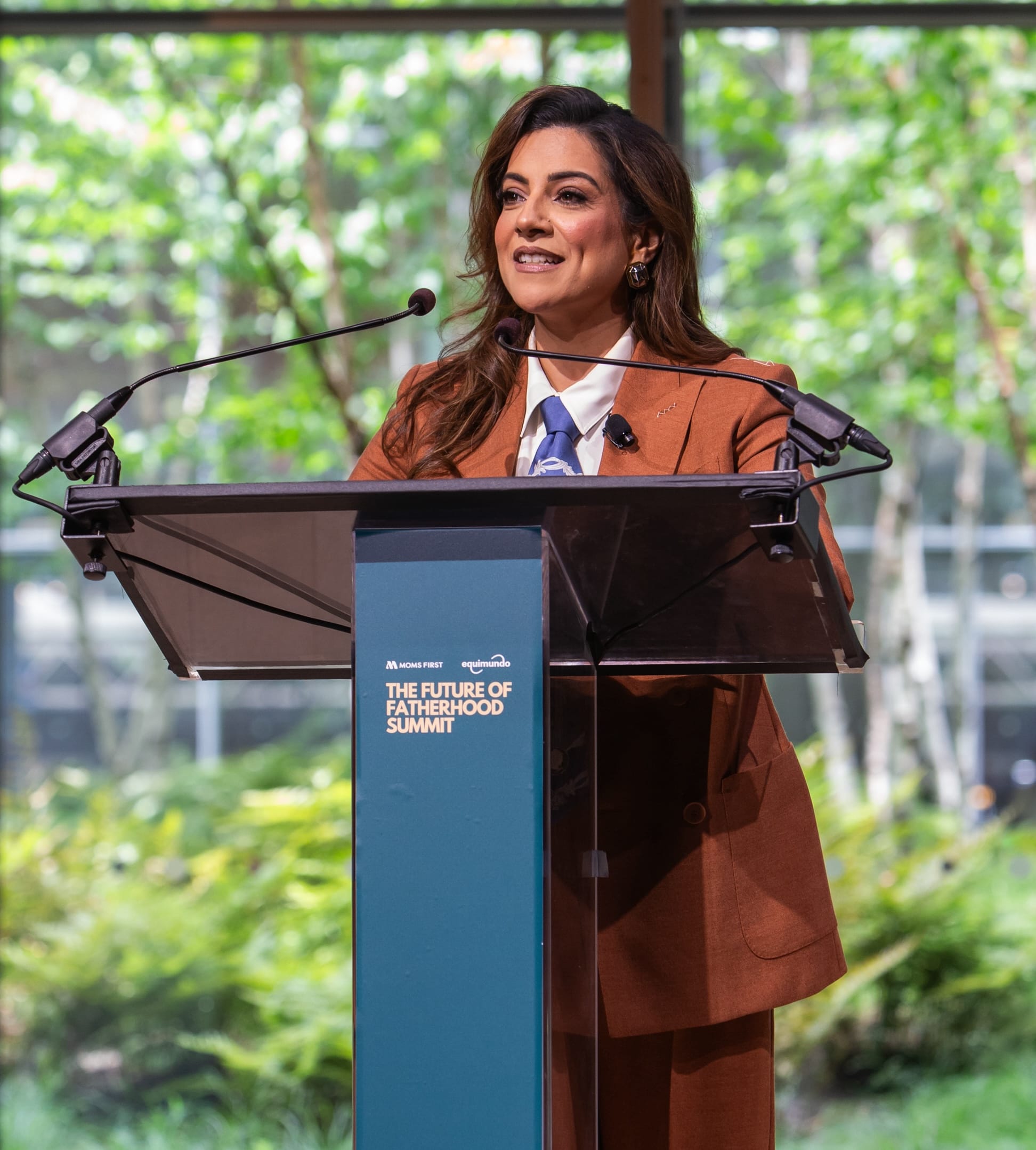Why Are Moms Hosting a Fatherhood Summit?

It was a few years ago, and Reshma Saujani had just delivered the commencement speech at a women's college. She had talked about igniting girls and women—a topic of passion for the founder of Girls Who Code and, more recently, Moms First, two organizations anchored in the fight for gender equity. As Saujani's two sons ran up to her, her eldest asked, "Mommy, why do you always talk about the girls? What about the boys?"
Saujani admitted she got annoyed at first. "I would say, 'You're just too little. You'll see what I'm talking about. Just wait.'" But then as time passed, it was Saujani who started to see: The boys are struggling. The men are struggling. And the world is not listening.
We are in a crisis of disconnection, says Saujani, and it calls for radical listening to start changing the conversation. That is why she and her organization, Moms First, teamed up with Equimundo to recently host The Future of Fatherhood Summit, gathering mothers and fathers for an honest, safe, and open conversation. The two organizations brought together advocates across the spectrum, from policymakers to business leaders to creatives, to explore modern fatherhood, masculinity, mental health, and more.
"The crisis of masculinity and the crisis of motherhood are symptoms of the same broken system," Saujani tells us. "That is why I wanted us to come together, not with an agenda, not with judgment, but just to listen to one another, to speak to one another, to hear one another."
We spoke with Saujani to learn more about the summit and how all of us—whether we are parents or not—can work together to create a more equitable world for everyone. These are highlights from our conversation.

We Need to Change the Conversation
"Progress is not a zero-sum game," says Saujani. However, part of why we lack empathy today is that we've been led to believe it is. "We think that when women rise, men have to fail— and that is what's dangerous." This has been a long issue concerning race, and now it is an issue surrounding gender. Men and women do not connect in the same way previous generations did. "The connection has dissipated," added Saujani. "And when you're not connected, you don't see your fights aligned, you don't stand up for each other, you don't trust each other. And that is what must change for us to solve any of these problems."
We Must Change Culture—Starting with Policy
A common misconception in the conversation around fatherhood is that men don't want to engage in childcare and don't want to take their paid leave. But Saujani calls the bluff on this. "The reality is that men want to take their paid leave. And men are doing more childcare than they were a decade ago. So, it's not necessarily about the behavior change that we have to make. The change we need to make is the cultural change—the policy change."
Saujani cites the example of Sweden, on which she credits economist Petra Persson for widening her lens. In 1974, Sweden became the first nation to introduce parental leave, replacing gender-specific maternity leave for mothers and fathers. At first, few to no fathers took leave. Eventually, policymakers considered how to change it and began implementing new policies that mandated the leave would be forfeited if the parents did not take it after a certain amount of time. "What happened is that some men started taking it, and then their brothers started taking it, and then there were colleagues started taking it, and it became the cultural norm," says Saujani. "Culture eats policy for breakfast every single day, and that is what we need to learn."
Men and Fathers Want to Be Heard
Saujani has spoken at and spearheaded countless women's summits. She said the energy at The Fatherhood Summit was different. More subdued and serious. "Every man had a notebook and was writing," she says. "And I cannot tell you the amount of notes I've gotten—and long notes—from these men!" The sense of men feeling seen was palpable and powerful, and Saujani credits the openness of the summit. "There were no pointing fingers," she adds. "It was about: Tell me how you're experiencing this. And what does it mean to be a dad? What is it like to raise a son? We came from a place of curiosity."
To Help Fathers and Everyone, Listen to the Men in Your Life
When Saujani's 10-year-old son snuggles up with her at night, that's when she "gets all the tea" about what's on his mind. "It's at that time that I ask, 'How does that make you feel? What do you think about that?'" she says. These tender moments remind Saujani that it's not just her sons she needs to ask these questions of; it's also her husband, her father, and all the men in her life. "We need to ignite permission for them to be emotional, and we have to invite that into the space.”
We Must Take Back the Narrative
"I used to get annoyed when I would speak at a women's event, and they invited men," admits Saujani. "I'm like, Really? Can we just have a place of our own?" Now, her mindset has changed. We must think about community differently, she adds. Men and women, fathers and mothers, need to gather, be open, and share fears and truths.
"We can't leave half the team sitting on the sidelines," she says. "We need to recognize we're our perceptions of who we think men are, who we think our boys are because it's not true. We need to control the narrative again."
Reshma Saujani is a leading activist, the founder of Girls Who Code, the founder and CEO of Moms First, and the host of "My So-Called Midlife." You can learn more about her work here, as well as about The Future of Fatherhood Summit, hosted by Moms First and Equimundo, here.
Please note that we may receive affiliate commissions from the sales of linked products.



